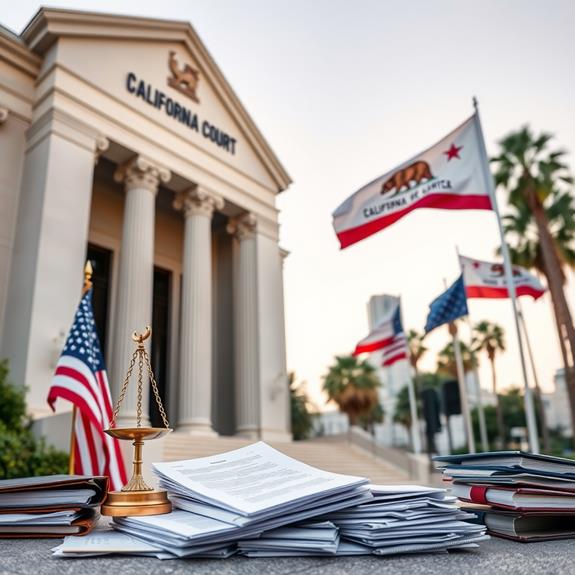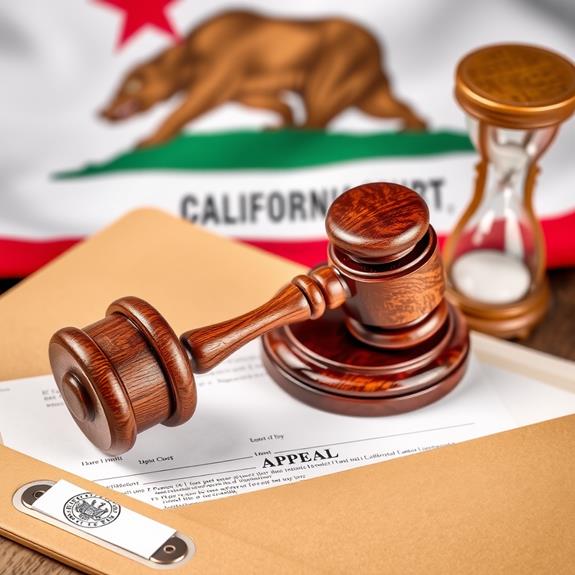To fight deportation in California, you'll need to understand the appeals process and your rights. Start by identifying strong grounds for appeal, such as legal errors or new evidence. File your Notice of Appeal within 30 days of the removal order, using Form EOIR-26 and including detailed reasons. Build a robust defense strategy by gathering evidence, highlighting your positive contributions, and addressing negative factors honestly. Consult an experienced immigration attorney to navigate the complex process, prepare a compelling brief, and follow BIA guidelines meticulously. With patience and thorough preparation, you can increase your chances of a favorable outcome. The following sections will provide more in-depth guidance on each step.
Understanding California Deportation Appeals

Steering through the complexities of California deportation appeals can be intimidating, but it's essential for those facing removal proceedings. Understanding the process can help ease deportation fears and improve your chances of a successful appeal. The first step is to know your rights and the grounds for appeal. Common reasons include legal errors, ineffective counsel, or new evidence. Effective defense strategies often involve exploring residency paths such as asylum or family-based petitions, tailored to individual cases.
It's vital to act quickly, as appeal timelines are strict. You typically have 30 days from the immigration judge's decision to file a Notice of Appeal with the Board of Immigration Appeals (BIA). During this time, gather all necessary documents and consult with an experienced immigration attorney. They can help you navigate the complex legal system and strengthen your case.
Your appeal should clearly state the reasons why the judge's decision was incorrect. Be specific and provide supporting evidence. The BIA will review your case and may either uphold the original decision, send it back to the immigration judge, or reverse the decision entirely. Remember, staying informed and organized throughout the process is key to fighting deportation effectively.
Grounds for Appealing Removal Orders
The foundation of any successful deportation appeal rests on valid grounds for challenging the removal order. You'll need to identify strong reasons to contest the decision. Common defenses include errors in the original proceedings, new evidence, or changes in your circumstances. Experienced deportation defense attorneys understand the intricacies of immigration law and can help craft tailored defense strategies that greatly impact removal decisions.
One vital ground for appeal is proving that the immigration judge made a legal mistake. This could involve misinterpreting laws or overlooking important facts. You might also argue that your rights were violated during the process. Another valid reason is demonstrating that you're eligible for relief from removal, such as asylum or cancellation of removal.
Legal precedents play a considerable role in appeals. These are past court decisions that support your case. Your lawyer can use these to strengthen your argument. Additionally, you can appeal based on ineffective assistance of counsel if your previous attorney made serious errors.
Filing Your Appeal Correctly

Properly filing your appeal is essential to its success. Timing considerations are vital, as you typically have 30 days from the date of your removal order to file. Gather all necessary appeal paperwork, including Form EOIR-26, Notice of Appeal. Complete the form accurately, providing detailed reasons for your appeal. Submit your appeal to the Board of Immigration Appeals (BIA) with the required filing fee or a fee waiver request. Experienced attorneys can provide invaluable assistance in preparing a strong appeal, ensuring all necessary documentation is included and deadlines are met.
Consider these emotional aspects of the appeal process:
- Fear of separation from family
- Anxiety about returning to an unfamiliar country
- Hope for a positive outcome
- Stress of maneuvering complex legal procedures
- Determination to fight for your rights
Ensure you follow all BIA guidelines for filing. Include a clear statement explaining why the immigration judge's decision was incorrect. Provide supporting evidence and cite relevant laws or precedents. Keep copies of all documents for your records. If possible, consult with an immigration attorney to review your appeal before submission. Remember, a well-prepared and timely appeal increases your chances of success in fighting deportation.
Building a Strong Defense Strategy
Building a strong defense strategy is the backbone of your fight against deportation. It's essential to approach this process systematically and thoroughly. Start by gathering all relevant documents and records that support your case. This evidence collection phase is vital and should include anything that proves your eligibility to remain in the United States.
Next, seek legal representation from an experienced immigration attorney. They'll help you navigate the complex legal system and identify the best defense arguments for your situation. Your lawyer will assess factors such as your length of stay in the U.S., family ties, and any potential hardships deportation might cause.
Work closely with your attorney to develop a compelling narrative that showcases your positive contributions to society. This might include your work history, community involvement, or educational achievements. Be prepared to address any negative factors in your case honestly and directly.
Navigating the Appeals Process

Steering the appeals process can be a vital step if your initial deportation defense is unsuccessful. When facing an unfavorable decision, you have the right to appeal to a higher court. It's important to understand appeal timelines, as you typically have only 30 days to file after receiving the initial decision. Securing legal representation is essential for managing this complex process effectively.
During the appeals process, you'll need to:
- Gather all relevant documents and evidence
- Identify specific legal errors in the original decision
- Prepare a compelling written brief
- Present oral arguments if required
- Stay informed about your case status
Your attorney will help you file the necessary paperwork and craft strong arguments to support your case. They'll also guarantee you meet all deadlines and follow proper procedures. The appeals process can be lengthy, often taking several months or even years to resolve. It's important to remain patient and maintain open communication with your legal team throughout this time. Remember, while appeals can be challenging, they offer a valuable opportunity to present your case to a different set of judges and potentially overturn the initial deportation order.

